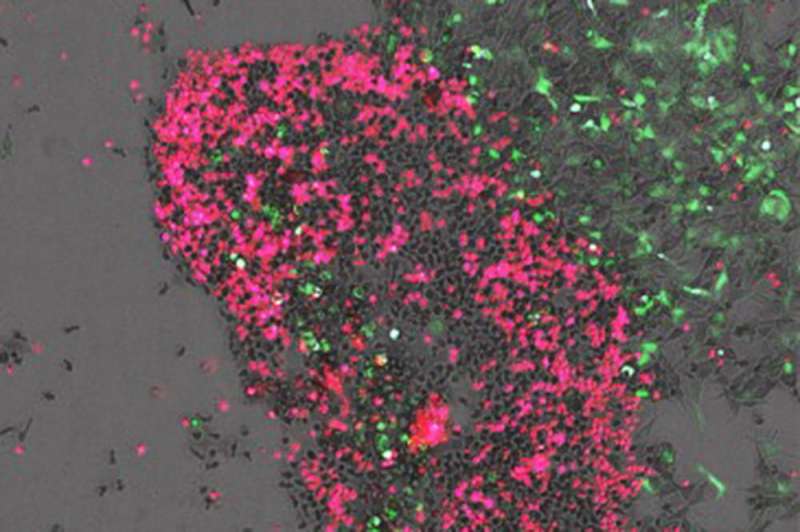This article has been reviewed according to Science X's editorial process and policies. Editors have highlighted the following attributes while ensuring the content's credibility:
fact-checked
peer-reviewed publication
trusted source
proofread
Researchers develop small molecule to stimulate natural killer cells against neuroblastoma

An MUSC Hollings Cancer Center research team has created what team members believe to be among the first small molecules designed to stimulate immune cells to fight cancer. More importantly, these compounds inhibit a specific enzyme that hasn't been targeted with small molecules for the treatment of cancer.
Small molecules are, quite literally, small. They're hundreds of times smaller than monoclonal antibodies currently used in therapy, and they're also structurally much simpler. Because of their low molecular mass, they are much more likely to enter cells. Aspirin, for example, is a small molecule drug.
The team from the lab of Hollings researcher Patrick Woster, Ph.D., describes its findings in a paper in Chemical Science. Postdoctoral fellow Catherine Mills, Ph.D., said she wanted to look for potential new therapies for neuroblastoma, a serious and often fatal pediatric tumor.
The resulting research project served as the subject of her doctoral dissertation. Mills explained that the small molecule the team created has the potential to one day be an adjuvant therapy, a therapy that boosts the effects of another treatment, for other cancers in addition to neuroblastoma.
"PD1 blockade has been massively successful in that patients who do respond, generally respond well," she said. "But the problem is that such a small subset of patients respond. With a small molecule adjuvant agent, it may be that we can improve the scope of patients who are responding to therapy."
There is also hope that this new small molecule could help to reduce resistance that can develop to monoclonal antibodies that eventually makes them ineffective. Patients with high-risk neuroblastomas are especially likely to find that their cancer becomes resistant to existing drugs.
There is increasing interest in developing small molecules for immune-based cancer treatments. Targeted therapies are often small molecules, but there are no approved small molecules for use in immunotherapy. In the past year, other investigators have developed small molecules designed to inhibit proteins that prevent the immune system from attacking cancer cells.
The small molecule developed by the Hollings team inhibits the enzyme activity of CD38, an immunomodulating protein that can be found on natural killer (NK) immune cells as well as other types of immune cells.
Scientists have already created monoclonal antibodies that bind to CD38, which is especially high in cancers like multiple myeloma. These monoclonal antibodies bind to cancer cells with high levels of CD38, which cause them to be destroyed by the patient's immune system. But CD38 has dual functions, Woster explained, and his team is targeting the second function, which is to make adenosine. Adenosine in high levels dampens the body's immune response.
The team screened a publicly available library of compounds to look for small molecules with potential to target CD38's enzyme activity. Upon identifying a candidate, the team then looked at its structural features and refined them to create a new compound that targets CD38 and stimulates the proliferation of NK cells.
"In the paper, we show that we can stimulate natural killer cells to multiply and thus more effectively attack and kill neuroblastoma," Woster said.
Mills compared the compound's action to a training montage in the movie "Rocky."
"You take the immune cells, and they're in a state where they're just kind of hanging out, really not doing anything," she said. "And you're basically giving them a personal trainer. By the end of this transformation, you should have pumped-up immune cells. They should be ready to go and really packing a punch in terms of anti-cancer activity."
Woster said that working at an NCI-designated cancer center like Hollings has made a difference in his work because there is a culture of collaboration.
"I was very pleased to see how collaborative people are at Hollings. In the Cancer Center, there are other scientists and clinicians who have similar research interests. They perform techniques in their laboratories that we can use. We also have a great system of research cores here. My decision to move to MUSC allowed me to greatly expand our cancer research program," he said.
Still, he cautioned that there is much work to be done.
"People really need to understand that you don't get an instant return from drug discovery. We are about as far from patients as you can get and still be in the process, but we are hopeful that these early steps will culminate in a new therapy for neuroblastoma and other cancers," he said.
The team intends to make further refinements to the compound to make it more effective and easier to manufacture and to ensure it acts consistently. They'll also continue to search for other similarly acting compounds, including compounds in the South Carolina Compound Collection at MUSC, to find candidates to target CD38.
"It is a long road, and there's a lot of other people who need to be involved," Woster said. "So this is very promising early work, but it is very early."
More information: Catherine M. Mills et al, Stimulation of natural killer cells with small molecule inhibitors of CD38 for the treatment of neuroblastoma, Chemical Science (2023). DOI: 10.1039/D2SC05749B
Journal information: Chemical Science
Provided by Medical University of South Carolina





















